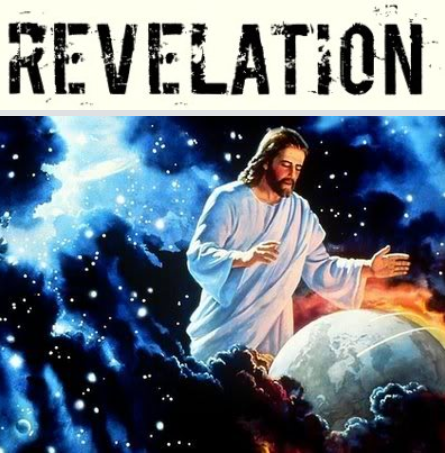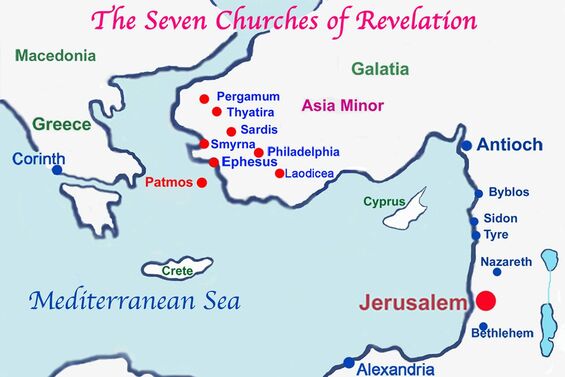Revelation 3:7-22
Lesson 473
Read both the "King James Bible" and the "New Living Translation."
In this lesson:
Lessons 471 and 472 continue.
Philadelphia, the compliant church (3-13).
Laodicea, the lukewarm church (3:14-22).
Look for Jesus' praise and promise to Philadelphia, and His rebuke and warning to Laodicea.
Every word in this passage is Jesus speaking.
Lessons 471 and 472 continue.
Philadelphia, the compliant church (3-13).
Laodicea, the lukewarm church (3:14-22).
Look for Jesus' praise and promise to Philadelphia, and His rebuke and warning to Laodicea.
Every word in this passage is Jesus speaking.
Where was -
Philadelphia
The Roman city of Philadelphia was in Natolia on the old Cogamus River (in modern-day Turkey), about twenty-five miles southeast of Sardis. Meaning "brotherly love," the city was founded in 190 BC by Attalus Philadelphus, the King of Pergamon (220-138 BC). The king built Philadelphia to block barbarians from migrating into the province. Although small, it became a wealthy business center. Despite the city's wealth, the church was humble and devout. A large portion of Philadelphia were pagans and Jews who persecuted Christians. The city has been destroyed by earthquakes and rebuilt numerous times over the centuries. It remained a Roman city until it fell to the Turks in 1392. Philadelphia (now called Alasehir, city of God) still exists and boasts a population of 105,000.
Laodicea
A wealthy city on the Lycus River seven miles northwest of Colosse (fifty miles east of Ephesus and south of Hierapolis) in the Roman province of Phrygia (the western part of modern-day Turkey). Initially called Diospolis and then Rhoas, King Antiochus II (286-246 BC) of Syria renamed the city for his wife, Laodice. Laodicea was a center of trade and banking and was so wealthy it minted its own money. The city was also famous throughout the Roman Empire for its manufacture of fine linens, cloth, wool, and carpets. Laodicea was the richest of the "seven cities" and boasted an excellent medical school that produced a popular eye ointment. Temples and magnificent theaters filled the city. However, the town was plagued with a poor water supply and forced to bring in water via a manmade aqueduct. Laodicea was destroyed by an earthquake in AD 60 but rebuilt by its well-to-do citizens. The city had a growing Gnostic population which threatened Christianity, and as documented in this passage, the church showed a weak commitment to Christ. This was an ongoing problem for Laodicea; Paul worried about their lukewarm twenty-five years earlier (Colossians 2:1). Still today, the word Laodicean refers to someone who lacks a strong religious or political commitment.
Philadelphia
The Roman city of Philadelphia was in Natolia on the old Cogamus River (in modern-day Turkey), about twenty-five miles southeast of Sardis. Meaning "brotherly love," the city was founded in 190 BC by Attalus Philadelphus, the King of Pergamon (220-138 BC). The king built Philadelphia to block barbarians from migrating into the province. Although small, it became a wealthy business center. Despite the city's wealth, the church was humble and devout. A large portion of Philadelphia were pagans and Jews who persecuted Christians. The city has been destroyed by earthquakes and rebuilt numerous times over the centuries. It remained a Roman city until it fell to the Turks in 1392. Philadelphia (now called Alasehir, city of God) still exists and boasts a population of 105,000.
Laodicea
A wealthy city on the Lycus River seven miles northwest of Colosse (fifty miles east of Ephesus and south of Hierapolis) in the Roman province of Phrygia (the western part of modern-day Turkey). Initially called Diospolis and then Rhoas, King Antiochus II (286-246 BC) of Syria renamed the city for his wife, Laodice. Laodicea was a center of trade and banking and was so wealthy it minted its own money. The city was also famous throughout the Roman Empire for its manufacture of fine linens, cloth, wool, and carpets. Laodicea was the richest of the "seven cities" and boasted an excellent medical school that produced a popular eye ointment. Temples and magnificent theaters filled the city. However, the town was plagued with a poor water supply and forced to bring in water via a manmade aqueduct. Laodicea was destroyed by an earthquake in AD 60 but rebuilt by its well-to-do citizens. The city had a growing Gnostic population which threatened Christianity, and as documented in this passage, the church showed a weak commitment to Christ. This was an ongoing problem for Laodicea; Paul worried about their lukewarm twenty-five years earlier (Colossians 2:1). Still today, the word Laodicean refers to someone who lacks a strong religious or political commitment.
The way to salvation:
First, acknowledge that we are all sinners
and that the penalty for sin is eternal death.
Second, repent and believe that Jesus Christ
is the Son of God who was crucified for our sins.
Lastly, pray and make Jesus Christ a part of your life.
Forgiveness of sins and salvation comes through the Son of God.
First, acknowledge that we are all sinners
and that the penalty for sin is eternal death.
Second, repent and believe that Jesus Christ
is the Son of God who was crucified for our sins.
Lastly, pray and make Jesus Christ a part of your life.
Forgiveness of sins and salvation comes through the Son of God.












